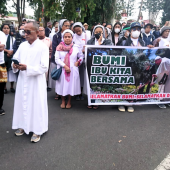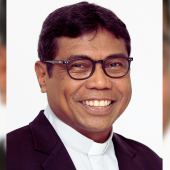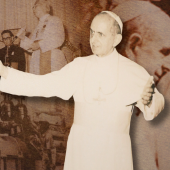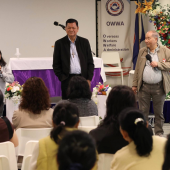Catholic priest encounters “shackled man,” brings healing to mentally challenged
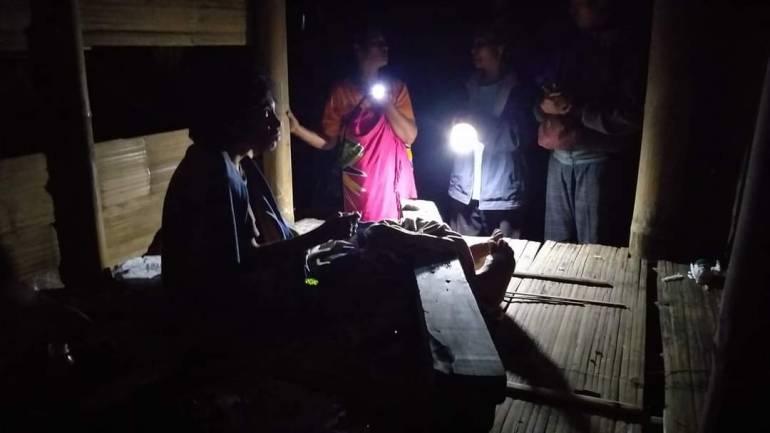
Catholic priest Aventinus Saur, SVD, met a adult man whose legs shackled with wooden blocks in a room in Ende Regency, Flores Island, Indonesia in 2014. The man’s hands too were barred. The priest noticed the man’s legs had wounds emitting a rotten odor.
The villagers informed the priest that the mentally ill man was kept in shackles as a result of murdering a village elder, a few months prior.
The priest noticed that the mentally ill patient was left untreated with sores on legs and hands, as well as on other body parts.
"The villagers had made it illegal for anyone to treat him," Father Saur recalls.
The Catholic priest heart ached as he watched the metally ill man in a helpless situation. Father Saur had discovered similar instances earlier of shackling mentally ill people. But it was not as extreme as the man he was looking at.
It prompted Father Saur to approach the regent of Ende Regency and the Archbishop of Ende, pleading for immediate intervention.
His efforts were not in vain. Following the man’s release from the shackles a few months later, the man was treated at his hometown's general hospital before being transferred to two different rehabilitation centers with more advanced recovery facilities.
Father Saur recalled being notified of numerous cases of shackled people and mental disorders in the aftermath of the public exposure by various mass media outlets.
He gradually visited them, documented them, and brought them to the attention of the local government.
The priest stated that the local government at the time were powerless to intervene due to the limited mental health services for those suffering mental disorders.
Overtime things changed. People throughout Indonesia expressed an interest in visiting and caring for these individuals.
In 2016, the priest founded Kelompok Kasih Insanis (KKI), The Human Love Group that cares for mental health in Indonesia’s East Nusa Tenggara Province.
According to Father Saur, today KKI has 1,500 volunteers spread across Indonesia's East Nusa Tenggara province and has documented and handled 7,500 cases till January 2022.
“The humanitarian organization's primary mission is to elevate the dignity of people who suffer from mental illnesses,” Father Saur told RVA News.
Father Saur combatted popular belief about mental illness with mental health education with the help of KKI volunteers.
“Most people believe that mental illnesses are not medical conditions. Mental disorders are due to demonic possession, a lack of faith, standard errors, mortal sins, ancestral punishment, or karma,” the priest said.
Karma is a the effect of one’s past actions.
As a result, he says, "the family of the mentally ill takes them to shamans and prays for the devil to be expelled so that karma is erased and sins are forgiven."
As the individuals suffering from mental disorders are not cured, the priest says, "the family permits them to be homeless on the streets (a psychotic tramp) or to be locked up in the house or a (outdoor) garden cottage."
According to Father Saur, such community solution leads to social discrimination.
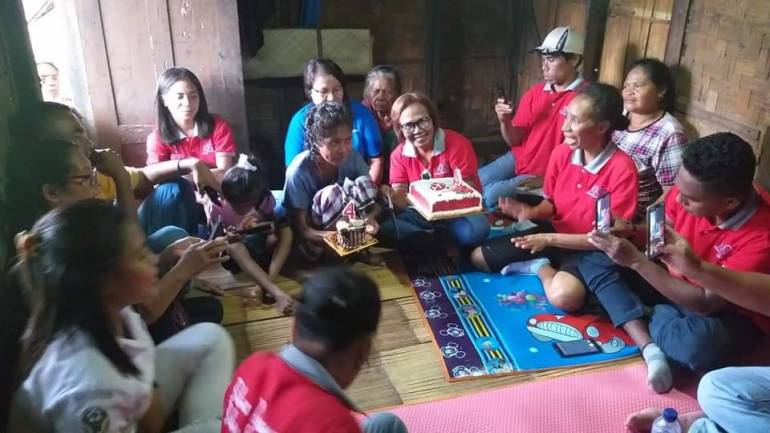
Therefore, KKI volunteers stress the mental disorders are to be treated by health professionals. But in the absence of adequate government infrastructure to treat mental disorders, KKI volunteers started to advocate for the rights of people with mental disorders.
As has been the case in Ende Regency, one of the regencies in Indonesia since 2017, the struggle has been successful.
The government has begun training doctors and nurses in mental health and providing medication to people suffering from mental disorders.
Even Father Saur and KKI volunteers successfully advocated for the rights of people with mental disorders before the Republic of Indonesia's Ministry of Health and Ministry of Social Affairs.
The officials traveled to Flores Island to conduct mental health training and engage in various discussions about mental health issues.
KKI volunteers also empower people who have begun to recover from mental illnesses.
“The objective is to enable survivors of mental illnesses, psychosocial disabilities, and mental disabilities to engage in productive activities,” the priest says.
KKI volunteers are perpetually on the move. They constantly visit people who have mental illnesses, collect data on new cases or recently reached instances, and provide mental health education in various settings and to a diverse range of members of society.
The priest challenged government, families, communities, and religious institution to view people with mental illnesses as human beings with inherent dignity.
Father Saur promotes a powerful viewpoint: In the eyes of the government, individuals suffering from mental illnesses are citizens whose rights must be respected. In the eyes of society, people with mental illnesses are entitled to protection. In the eyes of the family, individuals with mental illnesses are biological relatives. And religious institutions should view people with mental illnesses as individuals who need spiritual nourishment.
Mentally challenged people “must be treated, rehabilitated, and allowed to resume their everyday lives as citizens," the priest said.
Radio Veritas Asia (RVA), a media platform of the Catholic Church, aims to share Christ. RVA started in 1969 as a continental Catholic radio station to serve Asian countries in their respective local language, thus earning the tag “the Voice of Asian Christianity.” Responding to the emerging context, RVA embraced media platforms to connect with the global Asian audience via its 21 language websites and various social media platforms.









